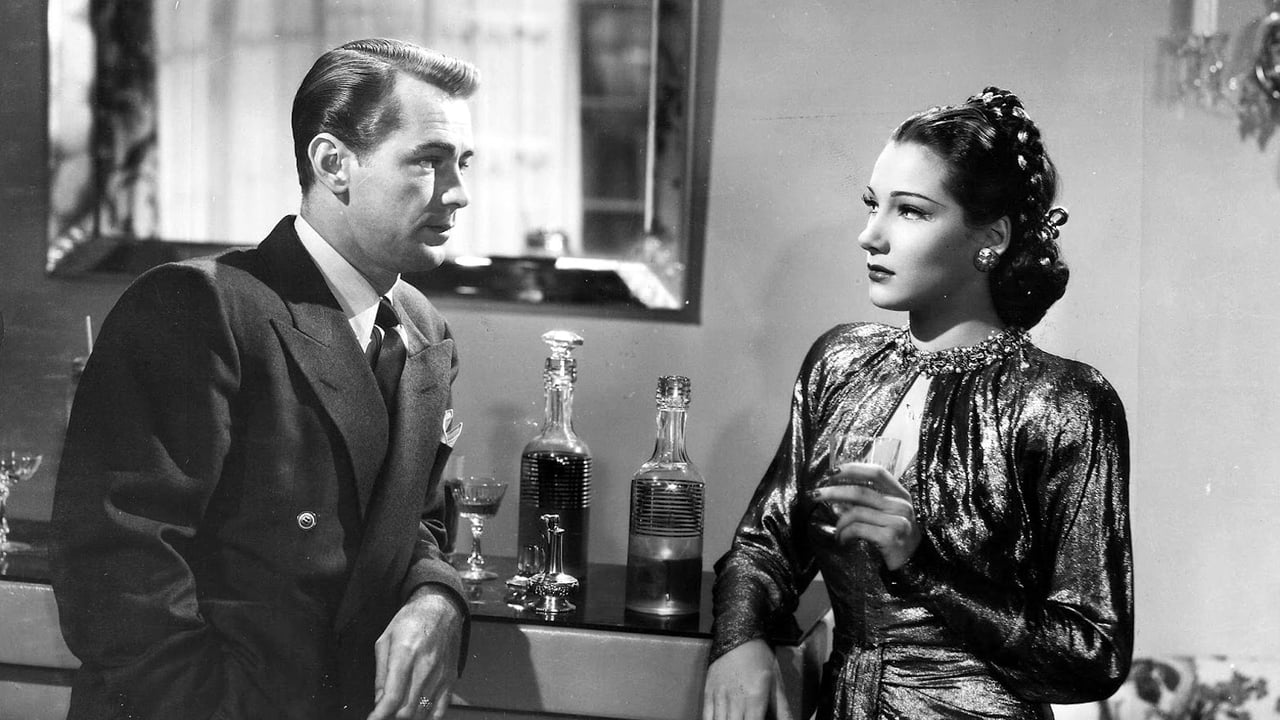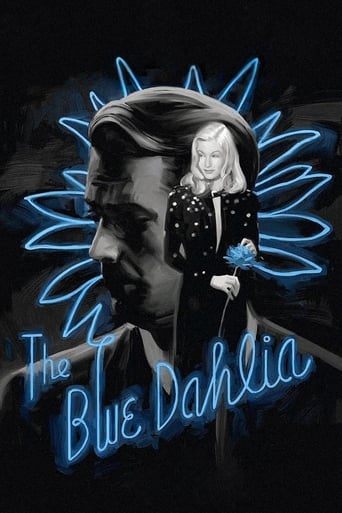

All right, so this is not a perfect film by any means but it does make for a pretty good film noir. In parts, the film does seem a bit rushed and chaotic. However, that all makes when you read the trivia section of the film on IMDb- the production of the film itself was rushed due to several factors, including Alan Ladd's expected induction back into the military service.After seeing several of her films, including this one, I can honestly say Veronica Lake is a fascinating screen presence in all of her scenes. She and Ladd,whatever their differences may have been in real life, did have real chemistry on-screen.Lake may not be the best actress there ever was, but she had a certain charisma about her in all of her roles, and although this role doesn't demand very much, she makes the most of her time in the role. She was also very beautiful, and my eyes always go right towards her whenever she is on-screen (no offense to Ladd.) Hers is a very sad story of how quickly a film career can go south, and I find it kind of sad that she was branded so difficult to work with by many of her co-stars.Fortunately, a lot more is understood about mental illness these days, and some actors (Catherine Zeta Jones is one example) who suffer from it can still enjoy a successful career. Lake had a truly outstanding role in "So Proudly We Hail!" and you can really see how talented she actually was in that film. It's hard to believe she was so young both when when her career started and ended.The supporting cast of this film is also great. It's nice to see Hugh Beaumont play a role other than Ward Cleaver, and Doris Dowling is a stunning woman, even as Alan Ladd's nasty wife. All in all, it's a fun movie and I'm glad I discovered it.
... View MoreAn ex-bomber pilot (Alan Ladd) is suspected of murdering his unfaithful wife (Doris Dowling).Today, this film might be best remembered as indirectly providing Elizabeth Short with the nickname "Black Dahlia". Short, or more specifically her murder, is far better remembered in popular culture than this film is.But, even more interesting is how it was written by Raymond Chandler on the fly, not from one of his novels. The producer recalled, "It was not until the middle of our fourth week that a faint chill of alarm invaded the studio when the script girl pointed out that the camera was rapidly gaining on the script. We had shot sixty-two pages in four weeks; Chandler, during that time, had turned in only twenty-two with another thirty to go." Essentially, no one knew what the end would be halfway through the shoot!
... View MoreI've said it before and I'll say it again -- when it comes to film noir, give me a cheap, ragged picture from some bargain basement studio over a glossy product from one of the biggies any day.This example of the latter is a bit of a bore, despite the presence of both Alan Ladd and Veronica Lake, who sizzled together in previous films but don't strike much of a spark here. They're given no assistance by George Marshall, who provides the film with its lugubrious direction, or the unremarkable screenplay courtesy of the Oscar-nominated Raymond Chandler. The screenplay didn't necessarily have to be a negative -- after all, many films noir have lackluster screenplays -- but it did require someone more skilled than Marshall to make something of it.The film's greatest asset is the performance of William Bendix as an ex-solider with PTSD, even if it's not actually called that in the film.Grade: C
... View MoreI last saw "The Blue Dahlia" years ago in a college film class. I remember liking it. Now that I've seen it again I find it a mixed bag. There are fine moments but the total package is unsatisfying.The story concerns returning WWII vet Johnny Morrison (Alan Ladd) going on the run when he's suspected of killing his two-timing wife (Helen Morrison). He's aided by Navy pals George (Hugh Beaumont) and Buzz (William Bendix), the latter suffering from what we now call PTSD. Complicating things are shady night-club owner Eddie Harwood (Howard Da Silva) and Joyce Harwood, Eddie's sultry ex (Veronica Lake). Johnny dodges miscellaneous thugs, cops, and plot twists in his quest to unmask the real murderer.The script was written by Raymond Chandler. Hollywood legend says Chandler had to get drunk to overcome a writer's block preventing his finishing the job. It's easy to believe, because the script is a mess. Alongside truly great scenes are baffling digressions which belong in a different movie. Joyce's romance with Johnny comes from nowhere and contributes nothing to the narrative. Much has been said about Navy Department pressure forcing the studio to change the killer's identity. Maybe in 1946 a homicidal vet would have shocked audiences, but to this modern viewer it's obvious early on whodunnit. The finished movie's final revelation may not be convincing, but at least it's a surprise.Though he comes close to going over the top in a couple of scenes, William Bendix is terrific as Buzz, the tortured vet. To Chandler's credit Buzz is a complex character. Though basically sympathetic, Buzz's affliction makes him prickly and erratic, a challenge his buddies don't quite know how to handle. Bendix makes the most of a challenging role.The leads are disappointing. Alan Ladd is convincingly tough in only a few scenes. It doesn't help that he's so well-scrubbed and pretty-looking. The part calls for someone with rougher edges. Pretty is about all Veronica Lake has to offer. Many people deride Lake's acting ability, but the real problem is that as Joyce she has nothing to do. Her character could be eliminated with little effect on the story. Doris Dowling is downright bizarre as Helen, the murdered spouse. She expresses inner turmoil by twitching, grimacing, and rubbing her stomach as if she were acting in a silent movie.The surprise of the cast is Howard da Silva. When he first appeared as Eddie Harwood I hated him. He looks like Walt Disney and speaks in a flat, tired voice. He seems anything but a powerful upscale hood. But as the story unwinds we see behind Eddie's facade. Cowed by Helen, yearning hopelessly for lost Joyce, Harwood is in over his head, projecting a smooth image while struggling just to stay afloat. In one of the movie's nicest scenes he finally faces reality. Weary and beaten, he confesses to Johnny that inside he always knew he was a small time guy trying to make it in a world that was way beyond his reach. Da Silva's performance proves to be dead on the money, and Harwood ends up one of the film's richest characters.
... View More